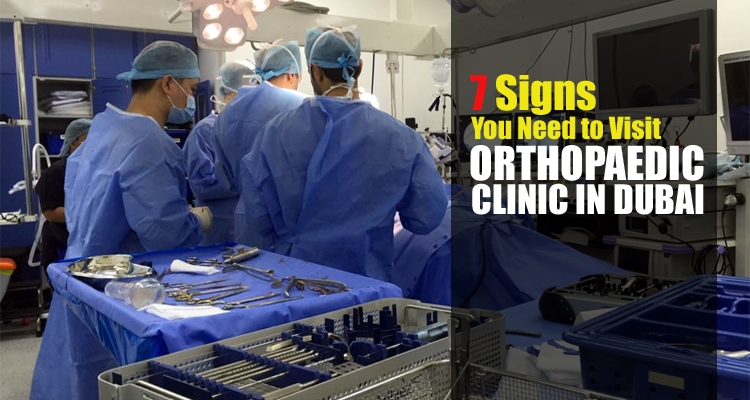7 Signs You Need to Visit to the Nearest Orthopaedic Clinic in Dubai
Maybe it’s one fall that’s caused a lingering pain, or it’s been a discomfort that’s been building for months that you’ve ignored, but we’re here to tell you that not listening to the pain in your muscles, nerves, or joints is never a good idea. Before a small problem becomes a chronic injury, we’re here to show you seven signs that it’s time to visit your local orthopaedic clinic in Dubai.
Also Read: 6 Tips for Staying Healthy and Fit in UAE in Winter
First, what is an orthopaedic clinic?
Orthopaedics is the field of medicine that focuses on conditions and diseases that affect your musculoskeletal system. This includes your bones, muscles, joints, nerves and ligaments and tendons. Orthopaedic doctors and surgeons focus on diagnosing and treating many conditions that negatively affect your musculoskeletal system. They help with rehabilitation and form strategies to help prevent further injuries or minimize chronic conditions, like arthritis, from getting worse.
Also Read: Stress: The Hidden Cause of Weight Gain and How to Fight It
Indications you might need to visit an orthopaedic clinic
Not sure if what you’re feeling warrants a visit to an orthopaedic clinic in Dubai? Here are seven signs that you should be looking up back pain doctor Dubai in your near future:
1. Constant pain in your muscles, joints or nerves
While it might seem obvious that constant pain warrants a visit to a doctor, many people get used to living with a certain amount of chronic pain. In fact, the resilience of people with chronic pain can actually make many doctors underestimate the severity of the injury or the suffering a person is going through.
We’re here to tell you that your pain is valid and that you should visit an orthopaedic clinic if you’ve been suffering from a nagging pain in your muscles, joints or tendons that doesn’t go away with rest or at-home treatment.
2. Aching or pain in the feet or legs
If you notice recurrent aching or pain in the feet or legs, you may have some lumbar issues that need to be addressed. A prickling sensation or numbness can indicate a nerve injury or a bulging disc that’s applying pressure to the nerves. This can often result in strange feelings in the feet or legs, or in the hips. While this might seem like a minor issue, numbness or tingling can actually be indicative of a larger issue.
If your pain or aching is limited to the feet, you may be suffering from plantar fasciitis or another mobility issue that your orthopaedic surgeon could address.
3. Tingling or numbness in your hands
Many of us work on computers for eight hours a day. These repetitive, tiny movements can lead to tingling or numbness in your hands. Have you noticed your hands or fingers tingling or feeling like they’re “buzzing”? Almost as though they’ve fallen asleep? If you also commonly drop things or have this tingling in your thumb or middle finger, you may be suffering from carpal tunnel syndrome. This syndrome can be caused by several things, such as a previous wrist fracture, working with tools or machinery that require lots of flexing of the wrist, or even something as innocuous as typing all day with an improper form.
4. A sprain or soft tissue injury
If you play sports or have a very active lifestyle, you may have experienced a sprain or soft tissue injury at some point. Sprained ankles or wrists are a common injury attributed to falling while playing sports or biking. A sprain is usually indicated by sudden pain and swelling directly after a hit or fall and the inability to move the joint or have it bear any weight. If this has happened, ice the injury and minimize movement. Then elevate the injured joint and take over-the-counter medication to ease pain and swelling. If your symptoms do not start to alleviate within a few days and you still cannot bear weight on the joint, you should see an orthopaedic surgeon to rule out a more serious injury.
5. Back pain when lifting something
If you lift weights or perform tasks that require you to lift weight and you notice you have some back pain that gets worse when you do this, you might need to contact an orthopaedic surgeon. This kind of back pain may be an indication that you have a herniated or slipped disc in your spine, which can become a serious issue if not addressed early. Rehabilitation and retraining your body to lift weight properly can mitigate this type of pain, but it all depends on how long it has gone on.
6. A restricted range of motion
If you notice that your range of motion is becoming limited, even without pain, you should book a visit to an orthopaedic surgeon. The issue here is that you may not even notice that your range of motion is becoming limited (another one of those gradual onsets that can get ignored). However, if you notice stiffness in your joints and a drop in flexibility, you may have a joint-related issue. It’s important to regularly check on your flexibility and stretch to reverse the effects of weightlifting, sports, or sitting for long periods of time. It will also help you pinpoint a decrease in flexibility.
7. Acute pain that limits your quality of life
Finally, any kind of acute musculoskeletal pain that limits your quality of life should be addressed by an orthopaedic surgeon. This can range from back pain to arthritis, to an injury, to a minor discomfort that has gradually increased over time to become debilitating. If you’re suffering from any pain you would describe as stabbing, sharp, or increasing with a certain movement, book a visit to figure out what’s going on.
Also Checkout: This is How COVID-19 Changed the Global Healthcare Industry
In conclusion
The key thing to remember is that experiencing pain on a daily basis is not normal and should be addressed. Don’t become discouraged by dismissive friends, family, or even general practitioners. We are often the best at knowing when something is wrong with our bodies, so it’s important to visit a skilled orthopaedic surgeon to an orthopaedic clinic in Dubai who will listen to your complaints and do a thorough assessment to understand what is causing your pain.




